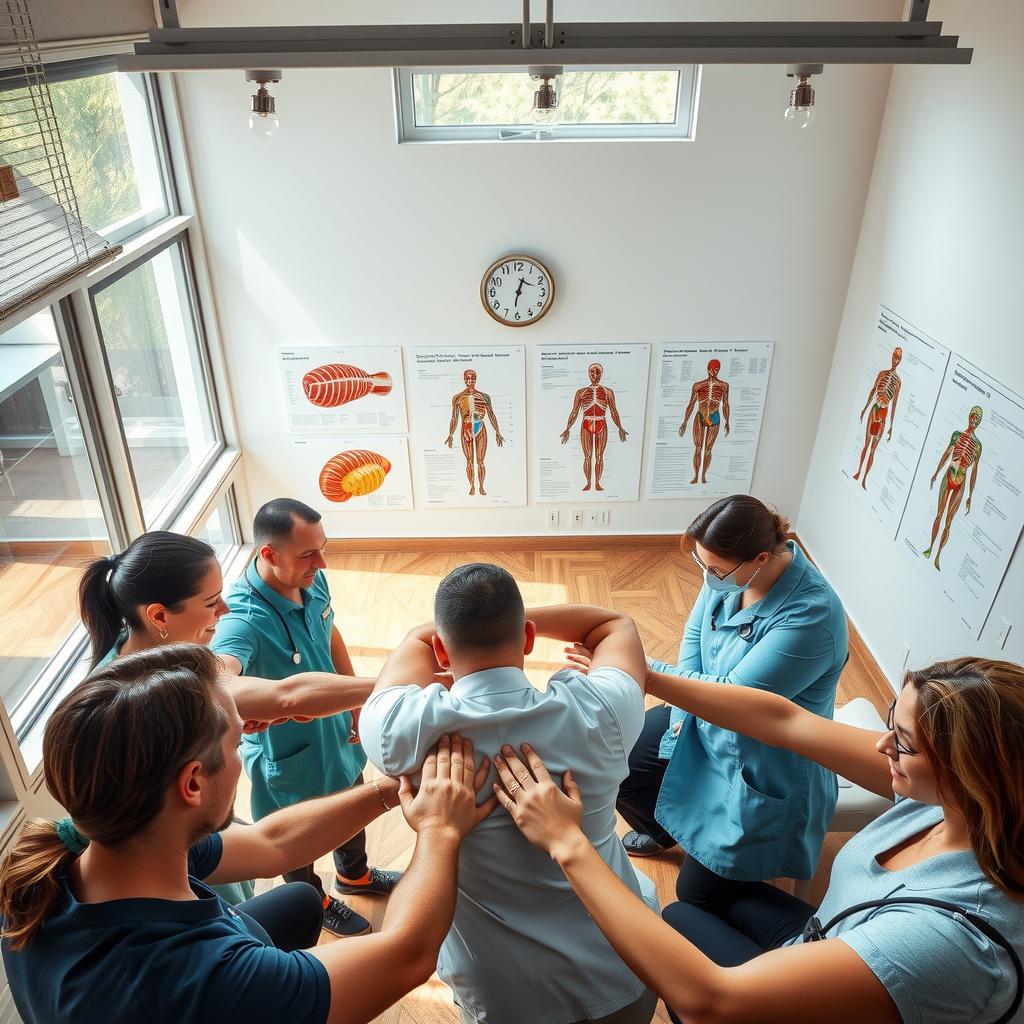In recent years, the field of alternative medicine has gained significant traction, particularly with approaches that emphasize a holistic health perspective. One such method making waves in health assessment is Applied Kinesiology. This unique system combines insights from traditional kinesiology with muscle testing techniques to identify health imbalances and assess body functions more deeply than conventional methods allow. Practitioners of Applied Kinesiology assert that muscle strength can be indicative of various physiological conditions, enabling them to evaluate not only physical ailments but also emotional and biochemical issues affecting an individual’s overall well-being. By employing basic techniques rooted in this discipline, practitioners utilize muscle testing as a diagnostic tool to pinpoint areas where the body’s energy may be disrupted or compromised.
The practice of Applied Kinesiology extends beyond mere diagnosis; it serves as a comprehensive framework for developing tailored exercise therapy programs aimed at enhancing physical performance and addressing specific health concerns. Through careful observation during muscle testing sessions, practitioners are able to discern how different stimuli—such as specific foods or environmental factors—impact muscular response and overall vitality. This dynamic interaction highlights the importance of self-regulation techniques within Applied Kinesiology, allowing clients to engage actively in their healing processes by understanding how their bodies react under varying circumstances.
Moreover, individuals seeking alternatives to traditional medical interventions often find solace in the principles underpinning Applied Kinesiology, which advocate for a balanced approach toward wellness. By integrating body function assessments into routine evaluations, practitioners can help identify underlying issues that may otherwise go unnoticed through standard medical examinations. The focus on identifying health imbalances empowers individuals not just to treat symptoms but also to delve deeper into causative factors contributing to their distress.
As healthcare continues its evolution towards more personalized treatment modalities, understanding the nuances of systems like Applied Kinesiology becomes increasingly crucial for both practitioners and patients alike. This blog post aims to explore how this innovative approach leverages muscle testing for effective health assessments while providing insight into its role within broader alternative medicine practices aimed at fostering optimal well-being through holistic methodologies.

Key Points:
-
Title of the key point: Principles of Muscle Testing
Muscle testing forms the cornerstone of Applied Kinesiology, serving as a diagnostic tool within alternative medicine. This technique evaluates muscle strength and response to stimuli, facilitating health assessment by identifying potential imbalances in body function. Practitioners utilize muscle testing to gauge how various factors affect muscle integrity, thereby uncovering underlying health issues that may not be evident through conventional medical evaluations. -
Title of the key point: Basic Techniques for Health Imbalance Identification
The basic techniques associated with Applied Kinesiology are essential for practitioners seeking to identify health imbalances effectively. These methods include manual muscle tests that examine specific muscles’ responses when subjected to stressors or challenges. By employing these foundational practices, healthcare professionals can discern areas requiring attention and tailor exercise therapy or self-regulation techniques that promote holistic health approaches. -
Title of the key point: Applications in Alternative Medicine
The applications of Applied Kinesiology extend beyond simple assessments; they integrate various modalities within alternative medicine frameworks. Utilizing insights gained from muscle testing, practitioners can develop personalized treatment plans aimed at correcting identified deficits in body function. This holistic approach not only addresses immediate concerns but also fosters long-term wellness through informed interventions grounded in thorough health imbalance identification and effective therapeutic strategies.

The Fundamentals of Applied Kinesiology
Exploring the Intersection of Muscle Testing and Alternative Medicine
Applied Kinesiology is an innovative field that bridges conventional health practices with alternative medicine, employing muscle testing as a critical tool for health assessment. At its core, this method evaluates muscle strength in response to various stimuli, allowing practitioners to identify potential health imbalances within the body. By assessing how muscles react under specific conditions or when exposed to particular substances, healthcare professionals can gain insights into a patient’s overall well-being and functional status. This holistic approach not only emphasizes physical responses but also considers emotional and biochemical aspects affecting health. In practice, applied kinesiology integrates concepts from chiropractic care, acupuncture, and nutritional therapy—a multifaceted strategy that serves patients seeking alternatives to traditional medical solutions. As individuals continue to seek personalized healthcare options tailored to their unique needs, understanding the principles behind muscle testing becomes increasingly significant.
The Technique Behind Muscle Testing
Understanding How Applied Kinesiology Works
Muscle testing in applied kinesiology operates on the premise that each muscle correlates with specific organs or bodily systems; thus changes in muscle function may indicate underlying issues related to these areas. Practitioners often employ basic techniques such as manual muscle tests where they apply resistance while asking patients to exert force against it—this dynamic reveals how well certain muscles are functioning at any given moment. For instance, when a practitioner observes weakness in a particular muscle during a test after introducing stimuli like food allergens or environmental factors, it could signal an adverse reaction linked with those elements affecting overall health balance. Furthermore, through repeated assessments over time using these strategies combined with exercise therapy protocols designed specifically for each individual based on findings from their initial evaluations can empower clients with self-regulation skills necessary for fostering wellness beyond appointments—ultimately contributing towards improved body function assessment capabilities among diverse populations seeking alternative methods of healing.
Identifying Health Imbalances Through Holistic Assessment
A Comprehensive View of Wellness Using Applied Kinesiology
The significance of identifying health imbalances cannot be overstated within the realm of holistic approaches offered by modalities like applied kinesiology, which offers tools essential for comprehensive evaluation processes aimed at enhancing patient outcomes through informed decisions regarding lifestyle adjustments or therapeutic interventions required post-assessment results reveal inconsistencies reflective upon one’s current state compared against optimal benchmarks established priorly by professionals experienced utilizing similar frameworks effectively across varied contexts throughout diverse presentations encountered clinically today worldwide! As individuals engage more deeply into this process involving regular check-ins via tested methodologies aligned closely together along pathways fostered between practitioner-client relationships cultivated over time will yield fruitful discussions around future intentions set forth concerning achieving desired goals surrounding personal growth about mental clarity alongside physical vitality blossoming naturally outwards reflecting positively back into daily lives lived fully enriched experiencing joy eluding previously dormant states once kept hidden beneath layers built-up due uncertainties faced navigating life’s complexities unassisted previously now illuminated anew thanks largely attributable being brave enough courageous take first steps forward exploration journey discovering true essence existence lies waiting patiently found deep within hearts minds alike ready share wisdom gained along way uplifting spirits everyone involved uniquely connected purposefully honoring divine nature inherent us all!

Key Principles of Muscle Testing
The Foundation of Health Assessment Techniques
Understanding the fundamentals of muscle testing is crucial for practitioners in the field of alternative medicine, particularly when utilizing methods such as Applied Kinesiology. At its core, muscle testing operates on the principle that muscle strength can be influenced by various factors including emotional state, nutritional status, and overall health balance. This method serves as an effective tool for health assessment and identifying potential imbalances within the body. Practitioners often employ specific techniques to gauge a patient’s muscular response to stimuli or questions posed during a session. By evaluating changes in muscle strength or weakness, they can gain insights into underlying health conditions that may not be readily apparent through conventional diagnostic methods.
The relevance of these principles extends beyond mere diagnosis; they provide a framework for implementing targeted therapy strategies aimed at restoring optimal function. For example, if a certain food is introduced and elicits weakness in specific muscles during testing, it may indicate an intolerance or allergy that needs addressing through dietary adjustments or supplementation. Moreover, Applied Kinesiology emphasizes the interconnectedness of bodily systems; thus assessments are not limited to localized issues but consider holistic impacts affecting overall well-being.
Exploring Basic Techniques
Practical Applications in Therapy
In practice, basic techniques related to Applied Kinesiology involve both manual muscle testing procedures and observational assessments meant to evaluate body functions comprehensively. These techniques require training and skillful application since accurate interpretation hinges upon understanding how various bodily systems interact with one another under stressors like physical exertion or emotional turmoil. A practitioner might begin with simple tests focusing on large muscle groups before progressing toward more intricate evaluations involving smaller stabilizing muscles.
The utility of these techniques becomes evident when integrating them into exercise therapy programs tailored specifically for individual clients based on their unique responses during assessments. Through careful observation and repeated trials using different modalities—such as resistance exercises paired with mindfulness practices—practitioners can promote self-regulation techniques enhancing client autonomy over their own health outcomes.
Furthermore, it is essential to understand how this approach aligns with holistic health paradigms emphasizing preventive care rather than reactive treatment strategies alone—a major tenet within alternative medicine philosophies where maintaining equilibrium among physical structure and mental aspects proves fundamental.
Identifying Health Imbalances
Insights Gained from Muscle Response
An integral aspect driving interest around Applied Kinesiology lies within its capacity for identifying subtle signs indicative of broader health imbalances impacting individuals daily lives without their conscious awareness thereof until tested explicitly via structured protocols governing muscular reactions elicited throughout sessions conducted by trained professionals versed adequately therein respective methodologies employed therein conjunction alongside other evaluative measures deemed appropriate per individual cases presented forth accordingly ensuring comprehensive insight gleaned timely manner necessary facilitate optimal intervention plans devised collaboratively client-centered frameworks established fostering empowerment while addressing multifaceted challenges encountered regularly lived experiences faced daily basis contextually relevant terms underlined importance embracing integrative perspectives guiding subsequent actions taken forthwith resulting beneficial outcomes achieved successfully attained desired goals outlined previous discussions held between parties involved collectively working together harmoniously navigate complexities surrounding personal journeys undertaken diligently committed continuous improvement paths followed consistently pursued relentlessly despite setbacks encountered along way fortitude cultivated perseverance nurtured unwavering dedication sustained efforts put forth consistently yield fruitful results ultimately fulfilling aspirations envisioned initially long term objectives set high standards maintained throughout process journey embarked upon fully embraced wholeheartedly undeniably transformative experience profoundly enriching life quality enhanced significantly thereafter experienced positively reinforced values instilled deeply rooted beliefs upheld steadfastly foster resilience growth inherent adaptability found innate potential harnessed effectively realized fullest extent possible thriving vibrantly amidst adversity encountered frequently navigated skillfully employing learned lessons derived invaluable experiences gained accumulated wisdom shared openly others benefiting greatly collectively empowered uplifted inspired forged bonds lasting connections formed strengthened unity purpose driven towards achieving common aspirations reached heights previously unimagined surpassing limitations once thought insurmountable ultimately redefining possibilities existing pathways explored continuously evolving landscapes paved new directions sought fervently aspiring greatness always striving betterment continually reinventing selves limitless potential recognized celebrated abundantly treasured cherished forevermore enduring legacies created timeless impact left indelible marks hearts minds souls touched journey undertaken together united vision forward propelled onward ever upward fueled passion unwavering commitment excellence exemplified beautifully encapsulating essence true spirit humanity illuminated brighter future awaits everyone involved hand-in-hand forging ahead undeterred relentless pursuit dreams cherished dearly fulfilled magnificently!
Holistic Health Approach
Integrating Body Function Assessments
A significant advantage offered by utilizing concepts from Applied Kinesiology pertains directly towards integration capabilities seen merging diverse disciplines encompassing nutrition science physiology psychology facilitating enhanced comprehension holistically perceived dimensions relative human existence characterized intricately weaving interdependencies arising naturally emerge recognizing symbiotic relationships establishing connections novel insights garnered enriched fundamentally expanding horizons explored depths unknown prior now unveiled revealing complexities hidden beneath surface interactions occurring routinely lifetimes passing unnoticed finally acknowledged brought forefront consciousness igniting curiosity motivating investigations deeper inquiries probing mysteries awaiting discovery unlocking secrets guarded jealously time immemorial illuminating paths lead enlightenment transformation awaited eagerly all participants engaged endeavors undertaken resolutely determined elevate states being transc
Understanding Muscle Testing in Alternative Medicine
A Gateway to Health Imbalance Identification
Muscle testing serves as a foundational technique within the field of alternative medicine, particularly when it comes to diagnosing and addressing various health issues. By utilizing methods from Applied Kinesiology, practitioners can assess the body’s functional integrity through muscle response. This approach allows for a nuanced evaluation of individual health imbalances that may not be readily apparent through conventional medical examinations. The basic techniques involve applying gentle pressure to specific muscles while observing their response; if a muscle weakens or fails to resist, this may signal an underlying issue related to organ systems or emotional stressors. Practitioners often correlate these findings with other assessments such as nutritional deficiencies or environmental toxicity, thereby adopting a holistic perspective towards patient care.
Techniques of Applied Kinesiology
Bridging Body Function Assessment and Healing
Incorporating Applied Kinesiology into practice involves several fundamental techniques that enhance the efficacy of muscle testing. These include reflex points and meridian pathways, which are utilized for assessing energy flow within the body. During an assessment session, practitioners might employ self-regulation techniques designed to foster internal balance while simultaneously identifying areas requiring attention. For instance, by pinpointing specific muscle groups associated with particular organs—such as the liver or kidneys—practitioners gather insights into potential dysfunctions affecting overall well-being. Additionally, exercise therapy is frequently integrated into treatment plans based on muscle testing results; tailored exercises can help correct imbalances discovered during assessments and promote physical resilience.
Holistic Health Approaches in Diagnosis
Comprehensive Frameworks for Patient Care
The integration of Applied Kinesiology emphasizes a holistic health approach that considers multiple dimensions of wellness—including physical, emotional, and energetic states—in evaluating patients’ conditions. Through meticulous health assessments, practitioners aim not only at symptom resolution but also strive to uncover root causes behind persistent ailments by identifying patterns indicative of deeper health imbalances. Muscle testing becomes invaluable here because it transcends mere symptom management; instead, it fosters communication between mind and body while allowing individuals greater agency over their healing processes. This multifaceted methodology encourages patients’ active participation in their own recovery journey—a principle central to many philosophies within alternative medicine.
Challenges and Considerations in Implementation
Navigating Skepticism in Alternative Practices
Despite its growing popularity among those seeking alternatives to traditional medical approaches, Applied Kinesiology is met with skepticism from some segments within the healthcare community due largely to perceived lack of empirical validation surrounding its practices like muscle testing. Critics argue that without rigorous scientific backing confirming its methodologies or outcomes consistently across diverse populations poses challenges toward acceptance among mainstream professionals committed strictly adherence evidence-based protocols . Nonetheless , advocates maintain strong anecdotal support bolstering claims regarding effectiveness treating chronic pain syndromes digestive disorders emphasizing need continued investigation research aimed validating principles underpinning applied kinesiology ensuring best practices refined aligned ethical standards established fields integrative complementary therapies .
Future Directions for Research
Expanding Knowledge Frontiers in Alternative Medicine
As interest grows around alternative modalities such as Applied Kinesiology,, there lies significant opportunity for future research endeavors aimed at exploring efficacy relating therapeutic interventions grounded upon findings derived via muscle testing. Conducting comprehensive studies could illuminate correlations between specific identified health imbalances rectified through targeted lifestyle alterations incorporating both psychological aspects alongside physiological factors involved enhancing overall patient satisfaction quality life experiences . Additionally , researchers should examine long-term impacts implementing self-regulation approaches promoting empowerment autonomy fostering sustainable habits reinforcing concepts integral modern integrative frameworks bridging gaps conventional paradigms ultimately enriching understanding human physiology interdependent relationships embodying intricate tapestry woven together each individual’s unique expression vitality wellbeing .
Inquiries:
Q: What is the principle behind muscle testing in applied kinesiology?
A: The principles of muscle testing in Applied Kinesiology revolve around the idea that muscle strength can be influenced by various physiological and emotional factors. By assessing a person’s muscle response to specific stimuli, practitioners can identify potential health imbalances. This technique serves as a valuable tool for holistic health assessments, allowing practitioners to pinpoint areas of concern that may require further exploration or intervention through alternative medicine approaches.
Q: How is muscle testing utilized for health imbalance identification?
A: Muscle testing plays a critical role in health imbalance identification within the framework of Applied Kinesiology. Practitioners employ basic techniques to evaluate how different substances, thoughts, or physical stresses affect muscular strength. For instance, if a certain food item weakens a tested muscle, it may indicate an intolerance or sensitivity that could contribute to overall wellness issues. This method facilitates personalized exercise therapy and dietary recommendations aimed at restoring balance and promoting self-regulation techniques.
Q: Can anyone learn the basic techniques associated with applied kinesiology?
A: Yes, individuals interested in holistic health can learn the basic techniques associated with Applied Kinesiology through proper training and practice. These fundamental skills enable participants to conduct body function assessments effectively and enhance their understanding of how various factors impact overall well-being. As they become more adept at using these methods, practitioners can integrate them into their existing practices or personal wellness routines while exploring how alternative medicine strategies complement traditional healthcare solutions.

Add a Comment